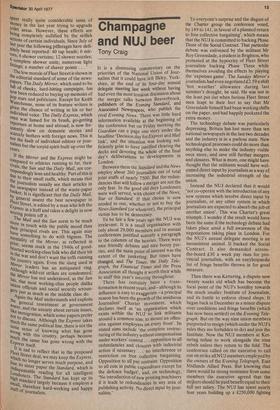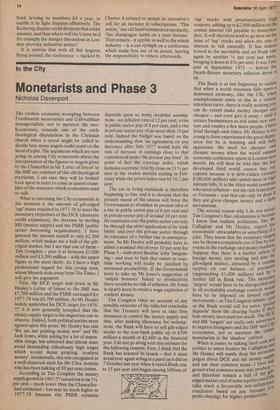Champagne and NUJ beer
Tony Craig
It is a distressing commentary on the priorities of the National Union of Journalists that it could have left Ilkley, Yorkshire, at the end of its four-day annual delegate meeting last week without having had even the most tenuous discussion about the merger talks between Beaverbrook, publishers of the Evening Standard, and Associated Newspapers, who publish the rival Evening News. There was little hard information available at the beginning of the conference but on Friday morning the Guardian ran a page one story under the headline 'Decision day for Express and Mail link', and the situation was looking sufficiently grim to have justified clearing the decks and devoting the whole of the final day's deliberations to developments in London.
Between them the Standard and the News employ about 260 journalists out of total joint staffs of nearly 7500. But the.redundancies that will follow a merger are not the only fear. In the good old days Londoners were well served, with choice of the News, Star or Standard. If that choice is now eroded to one, whether or not to buy the News-Standard (or whatever), the principal victim has to be democracy. To be fair a few years ago the NUJ was irrelevant. It is a small organisation with only about 29,000 members and its annual conferences justified scarcely a paragraph in the columns of the heavies. There were nice friendly debates and nice boozy parties, and the main point of interest was the extent of the junketing. But times have changed, and The Times, the Daily Telegraph, the Financial Times and the Press Association all thought it worth their while to staff this year's meeting throughout. There has certainly been a trans-. formation in recent years, and—although its influence is easy to exaggerate — a principal reason has been the growth of the assiduous Journalists' Charter movement, which declares itself as 'an organisation which exists within the NW to link militants
around a common aim: to mount an offensive against employers on every front'. Its
stated aims include 'the complete restruc
turing of the industry without compensation under workers' control . . . opposition to all
redundancies and closures with industrial
action if necessary . no interference or restriction on free collective bargaining.
Opposition to all pay restraint. Opposition to all cuts in public expenditure except for the defence budget', and, on technology,
'No introduction of new printing machinery if it leads to redundancies in any area of publishing activity. No direct input by journalists.'
To everyone's surprise and the disgust of the Charter group the conference voted, by 149 to 141, in favour of a planned return to free collective bargaining', which means that the NUJ is committed to backing Phase Three of the Social Contract. That particular debate was enlivened by the militant Mr Roy Greenslade, a student in Brighton, who protested at the hypocrisy of Fleet Street journalists backing Phase Three while themselves avoiding the effects by playing the 'expenses game'. The Sunday Mirror's journalists had even negotiated £2.59 a shift 'hot weather' allowance during last summer's drought, he said. He was not in the least put out when furious Fleet Street men leapt to their feet to say that Mr Greenslade himself had been working shifts on the paper, and had happily pocketed the extra money.
The technology debate was particularly depressing. Britain has lost more than ten national newspapers in the last two decades and the industry is in a parlous state. New technological processes could do more than anything else to make the industry viable once more, and save still further mergers and closures. What is more, one might have thought that the militants would have welcomed direct input by journalists as a way of increasing the industrial strength of the union.
Instead the NUJ declared that it would 'not co-operate with the introduction of any new systems which involve direct input by journalists, or any other system in which journalists are expected to absorb the job of another union'. This was Charter's great triumph. I wonder if the result would have been the same if the technology debate had taken place amid a full awareness of the. negotiations taking place in London. For the NUJ's annual delegate meeting is an inconsistent animal. It backed the Social Contract. It also demanded acrossthe-board £30 a week pay rises for provincial journalists, with an encylcopaedic list of fringe benefits thrown in for good measure.
Then there was Kettering, a dispute now twenty weeks old which has become the focal point of the NUJ's hostility towards the much smaller Institute of Journalists, and its battle to enforce closed shops. It began back in December as a minor dispute over conditions and fringe benefits (which has now been settled) on the Evening Telegraph. But on the way nine union members purported to resign (which under the NUJ's rules they are forbidden to do) and join the Institute. Now the NUJ members at Kettering refuse to work alongside the nine rebels unless they return to the fold. The conference called on the executive to call out on strike all NUJ members employed by the owners of the Evening Telegraph, East Midlands Allied Press. But knowing that there would be strong resistance from some members the executive agreed that the strikers should be paid benefit equal to their full net salary. The NUJ has spent nearly four years building up a £250,000 fighting
fund, levying its members £4 a year, to enable it to fight disputes effectively. The Kettering dispute could dissipate that entire amount, and then where will the Union be if for example the merger discussions in London provoke industrial action?
It is curious that with all this largesse flying around, the conference — backed by Charter 8 refused to accept its executive's call for an increase in subscriptions. 'This union,' one old hand commented succinctly, 'has champagne tastes on a beer income.' That remark it applies as well to the whole industry is a sad epitaph on a conference which made free use of its power, leaving the responsibility to others afterwards.



































 Previous page
Previous page